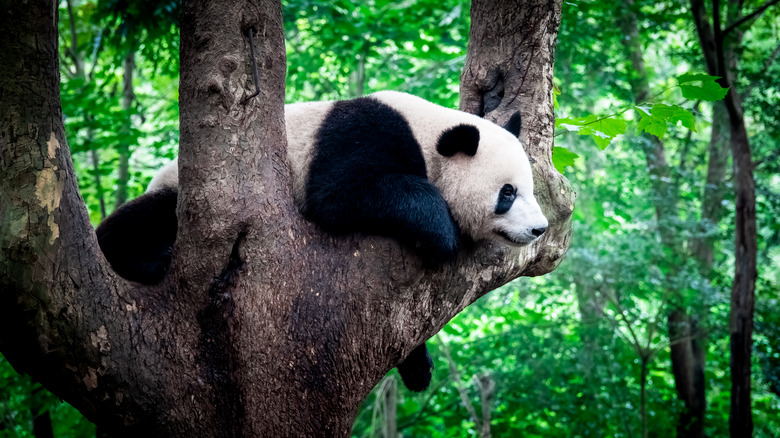The Giant Panda Who Successfully 'Faked' A Pregnancy To Receive Special Treatment
In the summer of 2014, a giant panda at the Chengdu Giant Panda Breeding Research Centre began showing signs that she might be pregnant. According to Independent, Ai Hin, one of the giant pandas living at the research center, exhibited a decrease in appetite and became less active. Showing these classic signs of panda pregnancy, her keepers moved her into a single room where she received constant care and attention. This included extra food, air conditioning, and special treatment.
Ai Hin must have known that being pregnant would come with perks, because her keepers eventually realized she was not actually pregnant, and may have even been faking it on purpose. As Wu Kongju, an expert in panda breeding at the Chengdu center, puts it, "some clever pandas have used [false pregnancy] to their advantage to improve their quality of life" (via The Guardian). Ai Hin was given pregnancy-related special treatment for two months before it was determined that she was experiencing a false pregnancy.
Phantom pregnancies are common in giant pandas
False pregnancy, also known as phantom pregnancy, is actually fairly common in giant pandas. Iain Valentine, director of Edinburgh Zoo's giant panda programme, states that determining if a panda is pregnant can be tricky because "they have a complicated biology. You've got this pseudo-pregnancy factor so using hormones as a biomarker for pregnancy in pandas just doesn't work" (via BBC News).
According to Zhang Heming, director of the China research and conservation centre for the giant panda, some pandas act pregnant because of their hormones. He states, "this phenomenon occurs in 10% to 20% of pandas. After the mother panda is inseminated, if her health isn't so good, the pregnancy will terminate, but she'll still behave as if she's pregnant" (via The Guardian). These phantom pregnancies are not just exclusive to pandas either, with Snopes reporting that these pseudo-pregnancies are also common in most endangered bears.
Ai Hin had higher levels of hormones, indicating a pregnancy
As it turns out, the reason Ai Hin's keepers thought she was pregnant wasn't just because she was putting on an act. In all mammals, the hormone progestrone is a biological requirement for a successful pregnancy (via the National Library of Medicine). According to the press release announcing what was thought to be her pregnancy, Ai Hin had "a surge in progestational hormone" along with her other symptoms, according to The Guardian.
As adorable as it is to imagine a panda faking pregnancy for extra treats, the evidence points to Ai Hin having a phantom pregnancy rather than faking one. Breeding pandas is extremely difficult, and part of the reason the species is considered vulnerable (via the World Wildlife Fund). Conservation efforts are aimed at reducing barriers for successful pregnancies in giant pandas, but as mentioned above, biological factors sometimes override human efforts to help these cuddly=looking mammals thrive.


